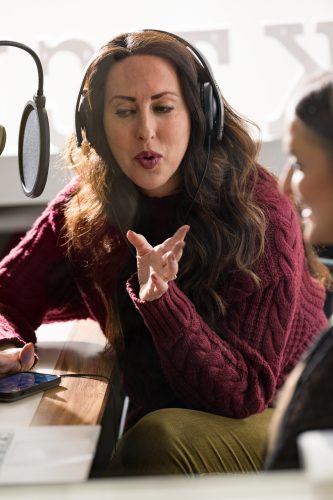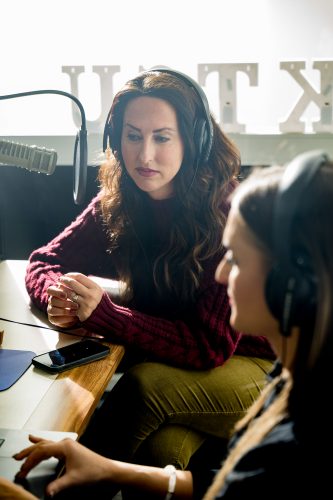
Throughout her youth, Tricia Jenkins, left, believed that the end times were near. Charity Robinson helped bring Jenkins’ story about life in a doomsday cult to a wide audience in the podcast Worldwide: The Unchosen Church.
Life on the Fringe
Tricia Jenkins’ podcast on growing up in a cult draws acclaim.
“SO WHENEVER I’M IN A NEW SITUATION AND I’M ASKED TO PARTICIPATE IN AN ICEBREAKER that essentially wants me to share something unique about myself, I always, always, always am tempted to say, ‘Hi everyone. My name is Tricia, and I grew up in a doomsday apocalyptic cult.’ ”
That startling revelation from Tricia Jenkins, professor of film, television and digital media in the Bob Schieffer College of Communication, opened the podcast Worldwide: The Unchosen Church. Jenkins, who earned a PhD from Michigan State University, did not initially think others would be interested in her experiences growing up in the Worldwide Church of God, which had close to 150,000 members globally at one point and hosted a weekly broadcast ministry on radio and then television for 60 years.
But Jenkins’ friend and colleague Charity Robinson, instructor of film, television and digital media, recognized a broader story that needed to be told. Over 11 episodes, with Jenkins as writer and host and Robinson as editor and sound designer, they wove together the narratives of former Worldwide Church of God followers into an award-winning podcast that chronicles not only the broader trajectory of the Worldwide Church of God but also the personal journeys of its members.
PRO STEPS IN
While Jenkins was new to podcasting, Robinson was already a pro. She owns Thirteen Media, which produces such podcasts as You, Me & Mike for HGTV personality Jenn Todryk. Robinson teaches podcasting at TCU and has her own podcast, ABC Story Sisters, in which her three young daughters bring children’s literature to life.

TCU professor Tricia Jenkins wasn’t sure if an audience existed for her experiences growing up in an apocalyptic cult.
“We’re in a time with podcasting when we have the unique ability as independent podcast creators to compete in a space with corporations like National Public Radio and still be able to be discovered,” Robinson said. “I thought her story was going to resonate with so many other people who didn’t necessarily grow up inside of a cult but inside of an abusive religious institution. Being able to share those stories so we don’t perpetuate them was something I thought was incredibly important.”
Contrary to the stereotype of cult members as uneducated, lonely and desperate people secreted away in a compound, Jenkins viewed her fellow Worldwide Church of God members, for the most part, as normal people hidden in plain sight in the community. However, that didn’t mean church teachings were mainstream.
“I think I always knew that my religious upbringing was not in sync with almost anybody else’s,” Jenkins said.
The Worldwide Church of God was founded in 1933 by Herbert Armstrong, a charismatic American newspaper advertising designer. As described in the podcast’s first episode by former member and skeptic DJ Grothe, “What [Armstrong] did was look around and look at all these kooky and interesting religions, and he did a sort of greatest hits.”
Jenkins cataloged the church beliefs that she grew up with: Members weren’t allowed to perform military service or vote. Women were expected to be subservient to men. Followers didn’t celebrate mainstream Christian holidays like Christmas and Easter because of their pagan origins. Members were discouraged from seeking medical treatment and instructed to rely on God for healing.
“A voyeuristic shaming emerges the moment people discover someone they know has a relationship to a cult,” said Glynn Washington, a former Worldwide Church of God member featured in Worldwide and himself the host of the popular storytelling podcast Snap Judgment. “This series helps close the gap between them and us.”
END TIMES
Armstrong’s white supremacist and homophobic doctrines dictated the demographics of the members, or chosen people, who were warned of an imminent World War III.

“I think I always knew that my religious upbringing was not in sync with almost anybody else’s,” said TCU professor Tricia Jenkins, left, about the Worldwide Church of God.
“When you honestly believe the world is going to end, you don’t do a lot of things that normal people do,” Jenkins said. “You don’t put money into your 401(k). You don’t save for your child’s college education. I never expected to live past the age of 20; I could never envision myself as an adult.”
Throughout the podcast, guests shares the lasting impact of their cult upbringing. In the episode “Blessed and Happy Is the Man — But What About the Woman?,” three former members talks about how the expectations for women affected their careers, marriages, parenting and sexual relationships.
In “Trust in God and Stand in Awe,” a member mourns the death of his 3-year-old sister to leukemia because his pastor father refused her medical care.
And in “The Worldwide Church of Pod,” Washington describes how he struggles to understand why his Black family joined the Worldwide Church of God given its overt racism. “I have hopefully garnered lessons from my experience,” he said, “to help prevent myself and others from falling into similar traps.”
In the 1990s, the Worldwide Church of God did an abrupt about-face by deradicalizing itself. In Episode 10, Jenkins describes how Armstrong’s successors, Joseph Tkach and Joseph Tkach Jr., “ended up rejecting all of the church’s heretical teachings and became what today would be labeled as a mainstream evangelical church. That move from the fringes to the fold came at an incredible cost.”
The organization lost more than half of its membership — including Jenkins. After her undergraduate education she moved to Thailand. Living amid a Buddhist culture gave her the distance she needed from the cult to form a new spiritual identity, she said.
EARNING PRAISE
As Robinson predicted, Worldwide resonated with listeners, who downloaded the show more than 61,000 times between May 2022 and August 2023. Statistics from the hosting platform show that the podcast performed in the top 5 percent of all podcasts on Buzzsprout for weekly downloads in 2022. It averaged a rating of 4.9 stars on a 5-star scale on Apple podcasts and charted in 25 countries.
“A lot of people reached out to say, ‘I thought I moved past this, but the podcast has forced me to go back and think about how that experience has influenced my adult life. I consider this podcast to be a form of therapy that I didn’t know I needed,’ ” Jenkins said. “That has been the most rewarding part of making this podcast.”
Jenkins and Robinson were thrilled when the podcast won the audio documentary category and Best of Festival award at the Broadcast Education Association’s 2023 Festival of Media Arts.
“We felt so proud to share the podcast within the context of education and see it was appreciated outside of the WCG and circles in which it already had been consumed,” Robinson said.
TCU colleagues also praised their work. “Tricia and Charity’s podcast exemplifies the type of innovative and publicly engaged work scholars should be doing,” said Ashley English, associate professor of strategic communication. “Their research creates conversation beyond academic circles, which is a critically important role for academia today.”
While Jenkins and Robinson have moved on to other projects, Worldwide: The Unchosen Church lives on.
“The cool thing about podcasts is that they are timeless for the most part,” Robinson said. “As long as they live on the platform, we will have new people discovering our stories.”

Your comments are welcome
Comments
Related reading:
Deeper Compassion
Joe Hoyle’s capstone project examines the impact of empathy training on scuba volunteers.
Immersed in Exercise
Kinesiologist Robyn Trocchio turns to virtual reality to help people have fun getting fit.
Banking on Growth
As Fort Worth continues to expand, Robert Sturns helps attract big business.